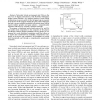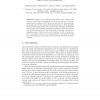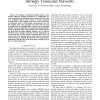484 search results - page 42 / 97 » Guessing Games and Distributed Computations in Synchronous N... |
ICDCSW
2002
IEEE
15 years 2 months ago
2002
IEEE
Time-driven Key Sequencing (TKS) is a key management technique that synchronizes the session key used by a set of communicating principals based on time of day. This relatively lo...
ICDE
2009
IEEE
15 years 4 months ago
2009
IEEE
— Networked virtual environments (net-VEs) are the next wave of digital entertainment, with Massively Multiplayer Online Games (MMOs) a very popular instance. Current MMO archite...
114
click to vote
CAAN
2004
Springer
15 years 3 months ago
2004
Springer
Imagine a set of self-interested clients, each of whom must choose a server from a permissible set. A server’s latency is inversely proportional to its speed, but it grows linear...
125
click to vote
TNN
2008
14 years 9 months ago
2008
We propose a distributed parallel support vector machine (DPSVM) training mechanism in a configurable network environment for distributed data mining. The basic idea is to exchange...
ACNS
2006
Springer
15 years 1 months ago
2006
Springer
Abstract. We study the impact of malicious synchronization on computer systems that serve customers periodically. Systems supporting automatic periodic updates are common in web se...



